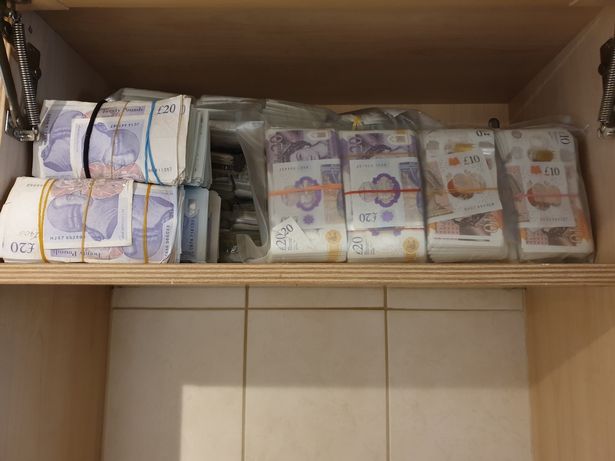By Tony O’Reilly-
Scottish Police have seized over £9m worth of drugs in crackdown on serious and organised crime groups between January and December 2022, officers together with £1.1 million in cash and £311,095 recovered under POCA (Proceeds of Crime Act) legislation.
In addition, officers from Glasgow’s organised crime unit also confiscated 35 vehicles, three firearms, 71 weapons and closed 40 bank accounts.
Chief Superintendent Mark Sutherland said: “I am optimistic about what we have achieved so far, but we are far from complacent.
“We remain fully committed to disrupting and dismantling organised crime groups operating in the Greater Glasgow area. This is in line with our commitment to achieving the aim and vision of Scotland’s Serious Organised Crime Strategy Taskforce.
“People’s lives are ruined by serious organised crime groups with their violence, intimidation and greed. They care for no one but themselves.
“I am determined to ensure that those involved are not above the law and that they can, and will, be held to account for causing misery and affecting the lives of the public.
“We are not alone in our bid to achieve this. We work closely with our colleagues in partner agencies and the public, sharing information, resources and intelligence in stamping out this illegal activity.”
Police Scotland said the anticipated income of these organised crime groups has been “substantially reduced” due to the ongoing work being carried out by divisional officers, specialist units and partner agencies working together to “deter criminal networks causing significant harm within communities”.
Laura Buchan, Procurator Fiscal for Specialist Casework at the Crown Office and Procurator Fiscal Service (COPFS), said the results demonstrated the “impact of a coordinated approach” to detect and disrupt serious and organised crime gangs in the Greater Glasgow area and beyond.
She said: “COPFS will continue to work with Police Scotland and other partners in the Serious Organised Crime Taskforce, using the full range of our powers to disrupt the ability of criminals to benefit from their illegal activity.
“These figures highlight that organised criminal networks are being dismantled across the Greater Glasgow area, and sends a clear message to those who seek to benefit from such activity that they will be pursued and their profits seized.”
Police Scotland worked alongside Glasgow City Council, COPFS, HMRC, the National Crime Agency, Home Office and Trading Standards in the crackdown on organised crime.
This week, officers recovered cannabis with an estimated street value of £400,000 during a search of a house in Broughty Ferry.
Two men, one aged 21 and the other 25, were arrested and charged and were expected to appear at Dundee Sheriff Court on Wednesday (February 1).
Police Scotland said officers were continuing to carry out inquiries in the area.
Inspector Keith Anderson said: “Tackling illegal drugs and removing this from our communities continues to be a priority for us.
“We rely on the support of the public to build intelligence on drug-related issues so that we can act on their concerns.”
MoJ predicts ‘potential tripling’ in use of courtroom video technology for vulnerable victims
Vulnerable victims in up to 4,600 cases involving crimes including sexual abuse and rape will be able to avoid giving their evidence in a full courtroom every year according to new estimates from the Ministry of Justice (MoJ).
It says annual estimates predict a “potential tripling” in the use of video technology for vulnerable victims.
The figures have been published alongside new legislation that for the first time will mean barristers are paid specifically for this work as part of the Government’s £138 million extra annual investment in criminal legal aid.
Since September, victims of crimes including rape and sexual assault have been able to pre-record their cross-examination ahead of trial in every Crown Court in England and Wales following a government-funded rollout of new technology.
This helps victims avoid the stress of giving evidence under full glare of a live trial setting, which many find traumatic, said the MoJ.
“This latest forecast shows that up to three times as many victims and witnesses could now be supported in this way compared to in the last two years, helping more of them achieve justice and boosting rape convictions,” it added.
The increase in fees will see lawyers paid £804, including VAT, for carrying out this work and ensure they are further incentivised to undertake the pre-recorded parts of these trials, potentially boosting capacity further.
Deputy Prime Minister, Lord Chancellor and Justice Secretary Dominic Raab said: “We have overhauled the support victims of rape receive and this latest investment will mean more have their voices heard in court without retraumatising them.
“Paying barristers specifically for this work will help make sure more victims have this option and is another part of our work to boost rape convictions.”
Pre-recorded cross-examination technology is available to certain victims of sexual and modern slavery offences in all Crown Courts in England and Wales. It is also available to vulnerable victims, such as children and those whose quality of evidence is likely to be diminished because of a mental or physical condition.
Measures allow for evidence to be given as close to the time of the offence as possible while memories remain fresh, increasing the likelihood of vulnerable witnesses achieving justice.
It is designed to maintain a defendant’s right to a fair trial and any decision to pre-record evidence is made by a judge on a case-by-case basis, the MoJ said.
The Government has also announced that pre-recorded evidence will be piloted for children and vulnerable adult witnesses for all offences at Leeds Youth Court to consider how it could be used more widely in trials of under-18s.
This new fee for lawyers taking video evidence will apply to all new cases from Wednesday (February 1). It will come on top of existing fees for attending court and ground rules hearings where a judge can consider any special measures for vulnerable victims and witnesses.

